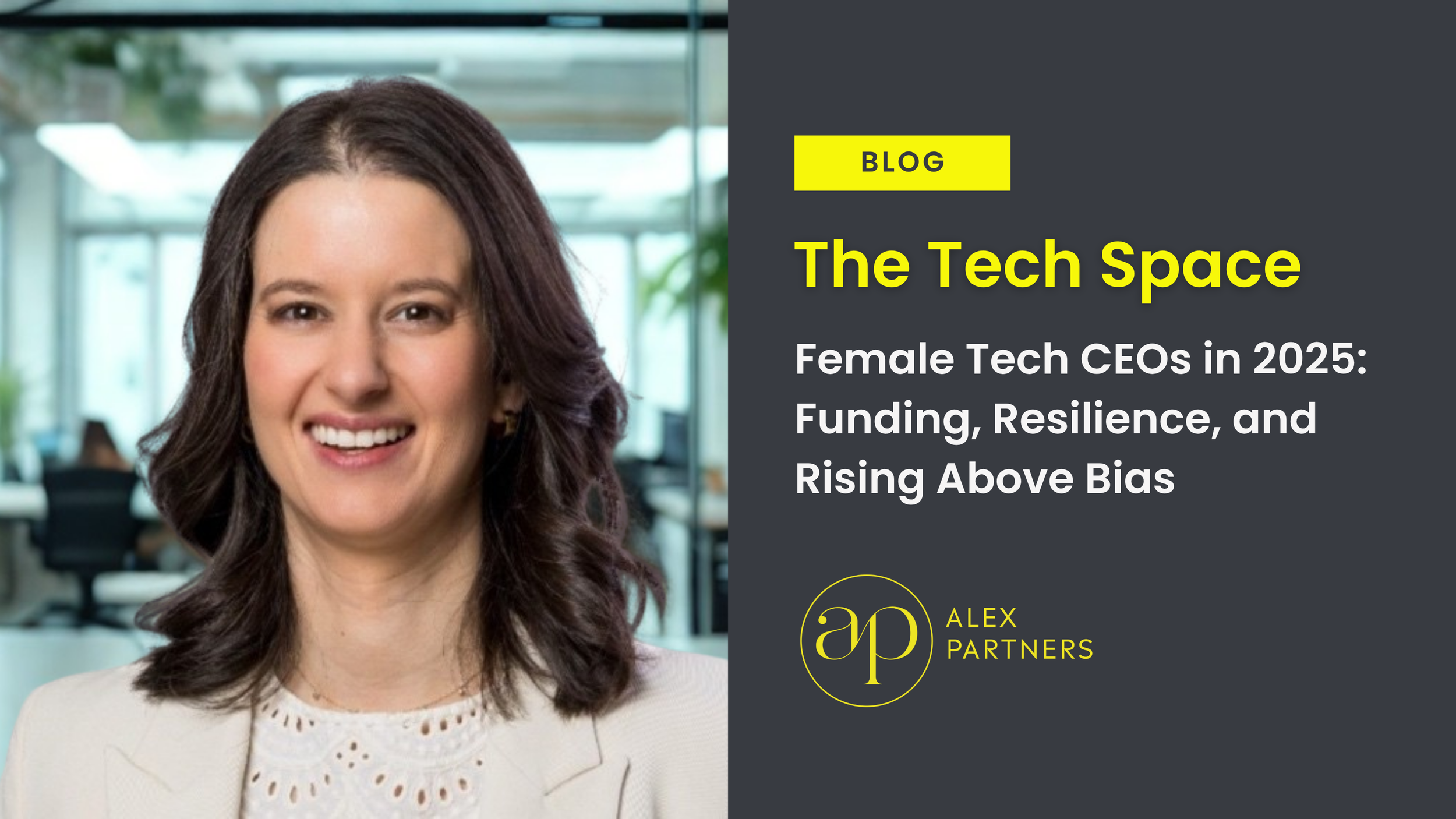Female Tech CEOs in 2025: Funding, Resilience, and Rising Above Bias
In 2025, the funding landscape for female tech CEOs is a story of gradual yet meaningful progress. The persistent gap in access to capital, particularly at later stages, remains a defining challenge. Structural bias, entrenched investor habits, and limited representation continue to influence outcomes for many women in tech leadership. Women are increasingly visible, securing capital, and driving innovation, yet the venture funding ecosystem still favours traditional patterns and biases. This tension between opportunity and challenge highlights the critical importance of resilience, adaptability, and strategic insight.
Cristina Fonseca, entrepreneur, investor, and co-founder of Portugal’s first unicorn, Talkdesk, shared insights in Alex Partners’ The Tech Space podcast that resonate strongly today. Her perspectives offer valuable context to recent data, illustrating how female founders can rise above persistent biases to thrive.
Funding: Progress and Persistent Challenges
Today, female-led tech startups receive 2.3% of global venture capital. For mixed-gender founding teams (those with at least one female founder), the share of funding rises to 14.1% in 2024. 83.6% of venture capital still flows to all-male teams, underscoring the systemic biases women founders continue to face.
Cristina Fonseca, speaking on The Tech Space podcast, pointed out that the imbalance starts well before venture capital. Since many founders come from technical fields, where women remain underrepresented, the odds are stacked against them, long before fundraising begins.
Her observation aligns with 2025 data, indicating that while early-stage investment for women-led ventures is improving, many women-led companies still face a significant 'scale-up cliff.' Securing large Series B or C rounds remains a substantial hurdle due to investor biases and fewer historical examples of successful large-scale exits.
Resilience: Turning Adversity into Opportunity
Cristina’s journey exemplifies the power of resilience. After successfully building and exiting Talkdesk, she co-founded Cleverly AI. Strategically opting to delay external funding until the product and market fit were solidified. Her reasoning, shared openly on The Tech Space, offers a lesson for female CEOs navigating today’s challenging conditions: “At Cleverly, we wanted to be fully confident in the technology and the product piece before scaling. We prioritised building a strong foundation first.”
Her approach illustrates a valuable lesson: resilience and strategic patience during adverse times can lead to sustainable long-term success. This aligns closely with current findings that businesses built during tougher economic periods often have stronger foundations, clearer product-market fit, and ultimately, higher resilience against market fluctuations.
Rising Above Bias: Role Models and Networks Matter
Bias in venture funding persists in part because investors still default to familiar success patterns, often favouring founders who resemble those they've backed before. Cristina, speaking on The Tech Space podcast, underscored the importance of addressing this early. She highlighted how exposing children to a wide range of careers, not shaped by traditional gender norms, and ensuring access to visible role models can help shift long-standing perceptions and expand the founder pipeline.
Today, more initiatives aim to provide female tech leaders with stronger networks and supportive ecosystems. Groups like Female Founders Fund, Diversity VC, and Golden Seeds have strengthened funding opportunities and mentorship frameworks. As these networks expand, they are helping break biases and establish new patterns of success, driving incremental increases in women-led investments.
Cristina herself represents a crucial shift as a visible role model, not only as a successful entrepreneur but also as an investor actively addressing biases within the investment community.
The Strategic Path Forward
Cristina’s insights from her time at Talkdesk and Cleverly AI remain particularly relevant today, offering clear strategic guidance:
Start Early: Encouraging more early-stage funding for women-led startups can dramatically improve the representation at later funding stages.
Expand Networks: Investing in and creating inclusive networks helps bridge gaps in the venture funding ecosystem, directly addressing the biases women founders face.
Embrace Role Models: Increasing visibility of successful female tech leaders is essential, encouraging future generations of women to enter the field and inspiring current founders to persevere.
Creating Lasting Change
The funding landscape for female tech CEOs in 2025 presents ongoing challenges but also significant opportunities for transformative change. Cristina Fonseca’s experiences, combined with current data, underline the critical need for resilience, strategic decision-making, and proactive network-building. The steady but clear progress women have made is proof that barriers can be overcome, and biases can be challenged.
Cristina Fonseca made it clear in the podcast that addressing the gender imbalance isn’t about favouring women over men. It’s about creating a funding ecosystem that is fair, representative, and built on broader access. Her perspective serves as both a call to action and a reminder that meaningful progress requires intentional, inclusive, and resilient leadership.

